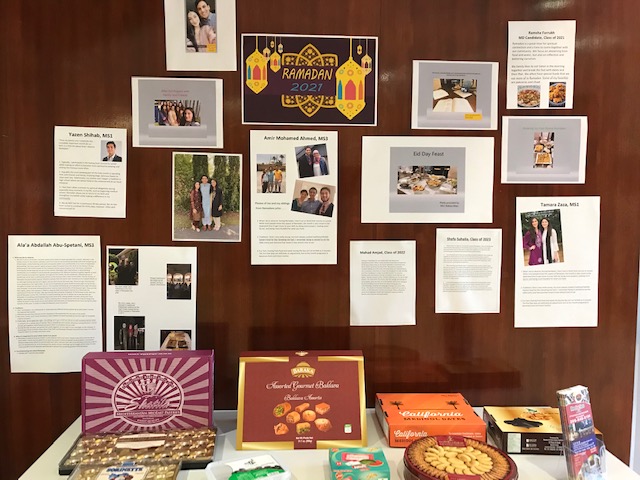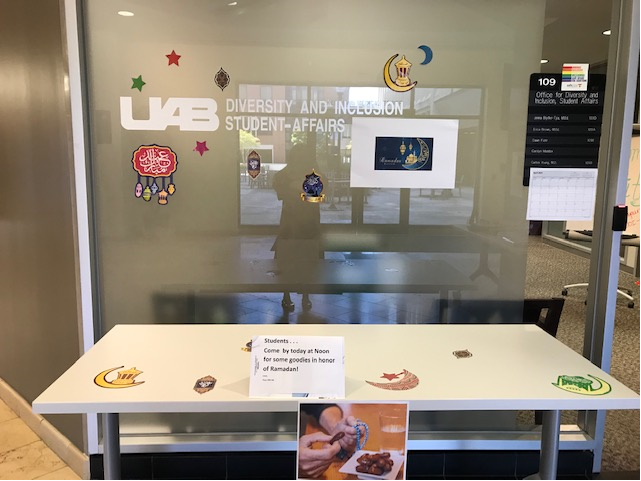
The impact felt by interest groups and associations is often two-fold. First, these organizations develop a sense of camaraderie and shared belonging—elements that prove beneficial throughout one’s medical school training and career. Second, the awareness garnered by these groups helps educate people who may not have had exposure to different cultures and life experiences.
Currently, the UABSOM Office for Diversity and Inclusion’s Student Affairs office is home to groups and associations for a range of ethnic and gender diverse students, including the Latino Medical Student Association (LMSA), Asian Pacific Medical Student Association (APAMSA), MedPride, and American Medical Women’s Association (AMWA).
Now, with the help of Ala’a Abu-Spetani (MS3), Rabisa Khan (MS1), Shefa Suhaila (MS2), and Muhammad Amjad (MS3), we will be adding the first religious student interest group, Muslims in Medicine. Giving us a sneak preview of what we can expect from the new group is Ala’a Abu-Spetani.
Ala’a attended UAB for her undergraduate studies and, impressed with its national recognition as a top medical school, returned to pursue her M.D. Additionally, Ala’a serves as a Diversity Ambassador, representing the UABSOM to prospective students.
Q: Tell us a little about yourself.
Ala’a: My family is from Palestine, but I was born and raised in Madison, Alabama. From a young age, I knew I wanted to be a doctor. There wasn’t any particular reason at the time, but moments along the way reaffirmed my decision.
When it was time to leave for college, UAB was so close I always knew I would apply. However, after learning more about the neuroscience program and UAB’s renowned medical school, I knew it was the right decision. During my undergraduate studies, I was part of the University Honors Program, which shaped my experience of UAB. The people and advisors who were part of the programs for my major and UHP were knowledgeable and well connected, which was incredibly helpful to me as a first-generation hopeful physician. Also, I come from a very family-oriented background and having them close enough to visit was important.
Q: When and why did you choose to become a Diversity Ambassador?
Ala’a: During my first year of medical school, I applied and was chosen to be an ambassador. It was important to me to be involved with the program because I believe in the power of representation.
Currently, there aren’t many women at UABSOM who look like me. While there are other Muslims at UAB, not everyone is as outwardly visible as I am. Of the women, I am one of about two or three who wears a hijab. Since I attended undergraduate school here and knew some of the upperclassmen, I was aware of the diversity on campus. But, for those out-of-state or who don’t know, I wanted my platform as a Diversity Ambassador to make them feel seen and welcome. For example, at one of the panels I was on for prospective students, a girl came up to me after the session because she noticed I was a fellow Muslim. She was from out-of-state and didn’t know anything about Alabama, and it wasn’t until she saw me that she was comfortable asking me questions. The same could apply to other students of color who see me—another person of color—representing our school.
I learned a lot from that moment. I think celebrating diversity and learning how to be more inclusive with the diversity we have is critical.
Q: Do you have anything to say to people who might be considering whether or not they want to be a Diversity Ambassador?
Ala’a: If you’re interested in becoming a Diversity Ambassador, be on the lookout for applications! It’s vital for all students, not just students of color, to participate.
Like the Muslims in Medicine student interest group, it’s essential to have people of all backgrounds engaged. It allows students to see different perspectives and learn from other cultures, which creates better physicians for the future.
Q: Currently, what stage of the start-up process is Muslims in Medicine in?
Ala’a: Right now, we’re in the process of getting the paperwork filled out and submitted to the university so we can be an officially recognized group. We’ve been discussing a name that wouldn’t imply it was only for Muslims, rather a group dedicated to helping people learn about our beliefs and culture so future physicians can better serve their patients.
Q: What is the mission of the group?
Ala’a: We have a few overarching goals. The first is to build allyship and future physicians who are advocates for their Muslim patients. For example, during Ramadan, doctors should discuss with their Muslim patients, in a culturally humble manner, any medication adjustments they need to make in order to maintain both their fast and their health. Another goal is similar to that of many other Muslim groups—reframing people’s minds regarding any misconceptions they may have about our religion. Lastly, we want to build a network for Muslim students and faculty to collaborate and learn from each other via mentorship and Lunch & Learns.
Q: What is the best way someone can be culturally humble?
Ala’a: That’s a good question. One of the best ways people can be culturally humble is to ask questions that show a willingness and desire to learn.
If you ask someone something about their culture and already have an answer in your head or expect a particular response, they can tell. However, if you’ve done your research and a question is coming from a place of sincerity, most people aren’t going to take offense. You don’t even have to preface with “I don’t want to offend you…” – people can tell just by your tone.
It's also important to do your own research or attend lectures to learn more about other cultures. That way, when you’re asking a question, it’s more thought-provoking and less of a burden to the person having to answer. Basically, you're doing your homework rather than expecting a person from a particular identity group to educate you.
This is why I prefer the term cultural humility versus cultural competence. No one expects anyone to know everything about every culture. But if people don’t know something, they should acknowledge that and be willing to learn, particularly if they make a mistake.
Q: Are there any ways current SOM faculty and staff can contribute to Muslims in Medicine?
Ala’a: Absolutely! If you’re interested in becoming a mentor or if you have a topic related to being Muslim in medicine that you would be willing to speak about, please reach out—we would love to hear from you. I can be reached at alaa14@uab.edu.

Ramadan Booth - Traditions
An education booth set up by Muslims in Medicine to spotlight Ramadan traditions in each member’s home.

Breaking Fast Box Pick Up
This booth was decorated and served as the pick-up place for boxed treats in celebration of the month of fasting.